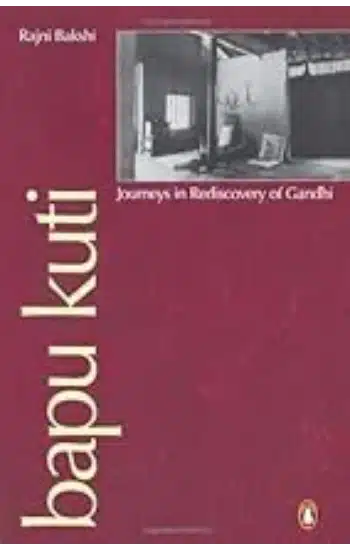

Bapu Kuti
Publisher:
| Author:
| Language:
| Format:
Publisher:
Author:
Language:
Format:
₹450 Original price was: ₹450.₹360Current price is: ₹360.
Out of stock
Ships within:
Out of stock
ISBN:
Page Extent:
Stories to inspire people who despair about India
Bapu Kuti, at Sewagram Ashram, Wardha, is the mud hut which was Mahatma Gandhi’s last home. Half a century after Bapu was killed, the Kuti is alive with gatherings of people who share his dreams. They do not call themselves Gandhians. Yet, as they search for solutions to the many problems of modern India, these activists find themselves coming to the same conclusions as had Gandhi.
In this collection, Rajni Bakshi explores the world and lives of twelve such people who have turned their backs on lucrative professions to embark on a search for practical and humane ways of political and social transformation, rooted in the faith that a new India with prosperity for all can be built on the strengths of cooperation and community. In Rajasthan, for instance, through a rare community effort, villagers make a creative livelihood instead of migrating to urban slums; in Andhra, impoverished weavers gain new life by reviving their dying craft; in Bhagalpur, Bihar, a movement is launched to liberate mother Ganga.
These images of passionate creativity present an India seldom seen in the mainstream media. They challenge the pervasive cynicism of our times to show that idealism did not die with Gandhi. Affirming humanity’s ceaseless striving to evolve to higher levels of being, they anticipate an age when conciliation must replace confrontation for building a more just future.
Stories to inspire people who despair about India
Bapu Kuti, at Sewagram Ashram, Wardha, is the mud hut which was Mahatma Gandhi’s last home. Half a century after Bapu was killed, the Kuti is alive with gatherings of people who share his dreams. They do not call themselves Gandhians. Yet, as they search for solutions to the many problems of modern India, these activists find themselves coming to the same conclusions as had Gandhi.
In this collection, Rajni Bakshi explores the world and lives of twelve such people who have turned their backs on lucrative professions to embark on a search for practical and humane ways of political and social transformation, rooted in the faith that a new India with prosperity for all can be built on the strengths of cooperation and community. In Rajasthan, for instance, through a rare community effort, villagers make a creative livelihood instead of migrating to urban slums; in Andhra, impoverished weavers gain new life by reviving their dying craft; in Bhagalpur, Bihar, a movement is launched to liberate mother Ganga.
These images of passionate creativity present an India seldom seen in the mainstream media. They challenge the pervasive cynicism of our times to show that idealism did not die with Gandhi. Affirming humanity’s ceaseless striving to evolve to higher levels of being, they anticipate an age when conciliation must replace confrontation for building a more just future.
About Author
Reviews
There are no reviews yet.


Reviews
There are no reviews yet.